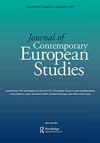民族党对欧盟的反乌托邦叙事中的本体论安全
IF 1.8
3区 社会学
Q1 AREA STUDIES
引用次数: 1
摘要
本文章由计算机程序翻译,如有差异,请以英文原文为准。
Ontological (In)security in the Rassemblement National’s dystopian narrative of the EU
ABSTRACT This paper explores the two most recent extended manifestos on Europe (2019) of the French populist radical right party Rassemblement National (RN), previously known as the Front National (FN), from a narrative perspective. The perspective used is based on the Narrative Policy Framework’s focus on the setting, plot, characters and moral of the narrative combined with a generic approach. Rather than the ‘classical’ genres of tragedy, comedy, romance and satire, however, this study focuses on the narrative elements of the dystopian genre, and argues that the RN’s narrative on Europe broadly resembles fictional dystopian narratives. In dystopian narratives, the inhabitants find their ontological security threatened by a dehumanising, authoritarian regime, in this case the EU. It is in the ‘green world’, a timeless space outside the limits of the dystopian state, here represented by the RN’s proposed European Alliance of Nations, where the dystopian hero recuperates their sense of autonomy and identity. Such narratives, through exacerbating an already widespread sense of anxiety and ontological insecurity, are potentially powerful attempts to frame continued membership in an unreformed EU as a threat to security.
求助全文
通过发布文献求助,成功后即可免费获取论文全文。
去求助
来源期刊

Journal of Contemporary European Studies
Multiple-
CiteScore
2.70
自引率
7.70%
发文量
84
期刊介绍:
The Journal of Contemporary European Studies (previously Journal of European Area Studies) seeks to provide a forum for interdisciplinary debate about the theory and practice of area studies as well as for empirical studies of European societies, politics and cultures. The central area focus of the journal is European in its broadest geographical definition. However, the examination of European "areas" and themes are enhanced as a matter of editorial policy by non-European perspectives. The Journal intends to attract the interest of both cross-national and single-country specialists in European studies and to counteract the worst features of Eurocentrism with coverage of non-European views on European themes.
 求助内容:
求助内容: 应助结果提醒方式:
应助结果提醒方式:


